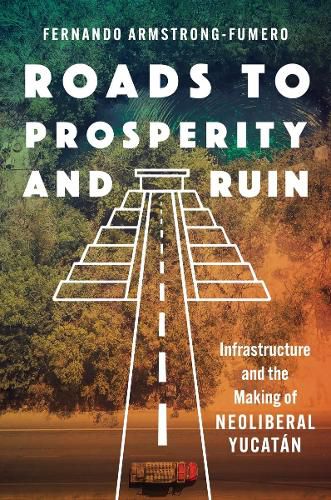Readings Newsletter
Become a Readings Member to make your shopping experience even easier.
Sign in or sign up for free!
You’re not far away from qualifying for FREE standard shipping within Australia
You’ve qualified for FREE standard shipping within Australia
The cart is loading…






In 2022, journalists announced the impending economic death of a small Mexican town. Piste, gateway to the famed Chichen Itza archeological site, would be circumvented by the Tren Maya commuter rail megaproject, depriving it of the promise of steady tourist traffic. Instead of ruminating with frustration, locals set to work on negotiations with the state and federal governments. Generations of experience taught them that pragmatic engagement with mainstream political parties was essential in turning into opportunity projects with the potential to kill the local economy.
Fernando Armstrong-Fumero situates the Tren Maya in a long history of roadbuilding and economic development on the Yucatan Peninsula beginning in the 1930s. Drawing together archival research and decades of ethnographic work, Armstrong-Fumero develops the concept of negative infrastructure to show how infrastructural and industrial investments configure rural economic futures as well as how communities seek to mitigate the harms from projects designed to benefit other regions or interests. The push and pull of development reveals the strategies residents use to influence political change through municipal elections and informal protest. Recognizing their life-changing potential, rural Maya Yucatecans recast infrastructural projects as new possibilities for inclusion, agency, and resistance as participants in formal state and economic structures.
$9.00 standard shipping within Australia
FREE standard shipping within Australia for orders over $100.00
Express & International shipping calculated at checkout
In 2022, journalists announced the impending economic death of a small Mexican town. Piste, gateway to the famed Chichen Itza archeological site, would be circumvented by the Tren Maya commuter rail megaproject, depriving it of the promise of steady tourist traffic. Instead of ruminating with frustration, locals set to work on negotiations with the state and federal governments. Generations of experience taught them that pragmatic engagement with mainstream political parties was essential in turning into opportunity projects with the potential to kill the local economy.
Fernando Armstrong-Fumero situates the Tren Maya in a long history of roadbuilding and economic development on the Yucatan Peninsula beginning in the 1930s. Drawing together archival research and decades of ethnographic work, Armstrong-Fumero develops the concept of negative infrastructure to show how infrastructural and industrial investments configure rural economic futures as well as how communities seek to mitigate the harms from projects designed to benefit other regions or interests. The push and pull of development reveals the strategies residents use to influence political change through municipal elections and informal protest. Recognizing their life-changing potential, rural Maya Yucatecans recast infrastructural projects as new possibilities for inclusion, agency, and resistance as participants in formal state and economic structures.